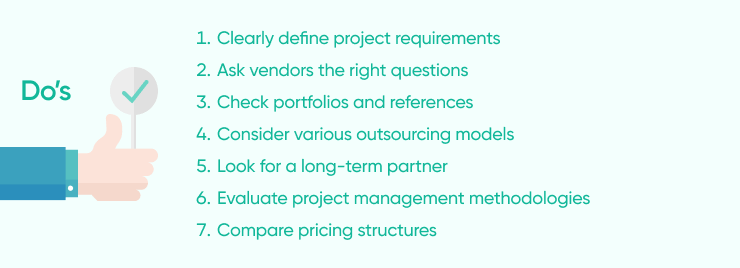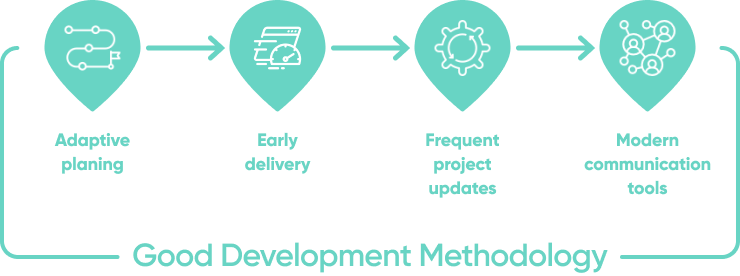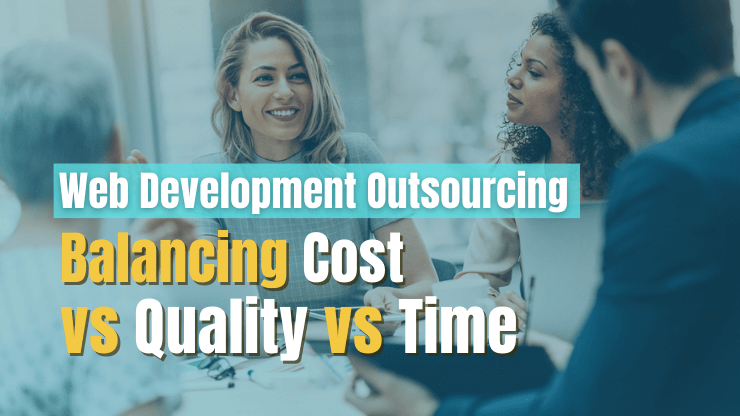Finding the right software development company can seem like a daunting task. High stakes and an overwhelming number of potential partners make hiring a software development company a critical aspect of your project's success.
This guide will simplify this task, focusing on key factors you should consider during the selection process, 14 critical do’s and don’ts of the process and finally, some next steps you can take to ensure you find talented developers and plan your next software project with confidence.
Our goal is to equip you with the essential knowledge needed to find a reliable software development partner, maximize your investment, and foster a prosperous long-term relationship. So let’s dive in!
What to Look for When Hiring a Software Development Company
Navigating the sea of software companies can be complex, with each bringing its unique offerings, advantages, and disadvantages to the table. This complexity can make the task of selecting the right partner seem daunting. However, the key lies in understanding your company's specific needs and aligning them with the right software developers. Let’s look at an overview of the key things to look for when hiring a software development team:
- Compatible outsourcing model: Determining the right outsourcing model is pivotal for project success. From staff augmentation, where you own the project, to managed team models with shared responsibilities, or the project-based model where the provider handles most tasks, the choice depends on your control preference. Keep in mind factors like budget, time zone, and communication needs while considering onshore, nearshore, or offshore options.
- Clear pricing structure: Grasping the pricing structure is another complex aspect of hiring a software development team or freelance software developers. You'll need to understand all potential costs, from upfront charges to ongoing maintenance fees and possible additional costs. Transparency in pricing can help you better manage your budget and avoid surprises later.
- Portfolio of relevant projects: Evaluating the portfolio of software developers can help you gauge their experience and capability. You'll need to consider whether they have successfully completed projects similar to yours, giving you a clear understanding of their range of skills and their ability to handle your project's specific requirements.
- Positive client reviews: Client reviews provide a window into the past performance of a software developer. Positive reviews can give you a sense of the company's reliability, professionalism, and the quality of their work.
- Strong communication skills: Communication is an often overlooked but critical aspect of software and web development. The best software developers are not just technically competent but also able to communicate well with each other, project managers and business leaders.
- Good culture fit: Regardless of if you’re hiring freelance software developers or a software company, you need to consider if they are a good culture fit for your in-house team. Identifying a full stack developer or software company whose work ethics, values, and communication styles align with yours can contribute to a more harmonious and productive working relationship. This requires a keen understanding of both your own organizational culture and the culture of your potential partner.
Hire Software Development Company - Do’s
Now that you're aware of the key considerations while hiring a software development company, it's time to apply this knowledge. In the next section, we'll be discussing actionable tips for implementing these insights during the hiring process. This will guide you towards effectively identifying and partnering with the right software company for your specific needs.

Clearly define project requirements
You can hire the best expert software developers in the world, but if you don’t clearly define your project requirements you will end up wasting a great deal of time and money. This requirements gathering step sets the stage for everything that follows - from the selection of the company to the development and delivery of the software.
By outlining your project requirements, you provide potential partners with the information they need to understand the project's scope, its objectives, and your expectations. This helps companies gauge whether they can deliver on your vision and gives them the ability to provide more accurate cost and time estimates.
Requirements can fall into a few categories:
- Functional requirements: Detailing the specific functionalities and features the software must have to meet its objectives.
- Non-functional requirements: Covering aspects beyond functionality, such as performance, security, scalability, and user experience.
- Technical requirements: Specifying the technology stack, programming languages, and frameworks necessary for the development process.
- Timeline and milestones: Defining the project's timeline, including specific milestones and delivery dates, to track progress effectively.
PRO TIP: Software Requirements Specification (SRS) is very useful when hiring software developers or vendors, as it will allow them to create more detailed software development cost breakdown.
An SRS should include:
- Product summary and scope
- Intended audience
- Assumptions and dependencies
- Functional requirements (what the system is supposed to do)
- Non-functional requirements (how the system should perform)
- Acceptance criteria
Ask vendors the right questions
After you’ve taken the time to scout out potential companies or software engineers that have the potential to align with your vision, you’ll want to ensure that they really do match up with your expectations. One of the best ways to do this is by using a set of interview questions. The answers that you receive to these questions will help you narrow in on teams that will be best able to deliver reliable results.
We recommend starting with this curated list of questions:
- Could you present a project similar to mine in terms of technology, functionality and/or business domain?
- Can you provide good references from previous projects?
- What kinds of companies do you typically work with? / Who is your ideal client?
- Who will manage my project?
- What does your typical process look like?
- How do you ensure quality on your software projects?
- What reporting practices and collaboration tools do you use?
- Can you present the people who will deliver services to me? What is their experience level?
- Tell me about your hiring process. Where do you find your candidates and what do you look for when hiring developers?
- How many developers do you have working with my technology?
- Will the developers assigned to my project work on any other project at the same time?
- How often do you people change projects?
- Why should I choose you rather than your competitors?
- What are your rates and payment terms?
- Can you estimate the length of my project?
PRO TIP: Depending on the number of vendors you’re interviewing and the scope of the project, the process can become very time consuming. To help streamline processes, you can divide up the interviews between staff members, but make sure you have identified a specific individual to lead the procurement process and provide oversight. This person should decide which questions will be asked and help to keep the discussions with potential vendors organized and consistent.
Read More: 15 Software Vendor Interview Questions [Procurement Guide]
Check portfolios and references
One significant step in the selection process of software developers is the thorough evaluation of their portfolios and references. This assessment not only provides an understanding of the company's capabilities but also allows you to gauge their experience level and adaptability in handling various types of projects. A well-documented portfolio can illustrate whether the company has previously tackled software projects similar to your requirements, ensuring they have a concrete understanding of your industry, market, and business process.
In assessing portfolios and references, look for:
- Industry relevance: Check if they have successfully completed projects in the same industry as yours or targeted at a similar audience. This can suggest a level of understanding and experience with the unique challenges and requirements of your field.
- Technology alignment: Look for projects where they have used the same or similar technologies (such as Python, React.js, etc.) as your project requires. This can indicate their technical proficiency and ability to meet your project's technological needs.
- Comparable scope: Seek out past projects that align with the scale and scope of your project. This can provide insight into the company's ability to manage and successfully execute a project of your magnitude.
Consider various outsourcing models

There are many software outsourcing models you can use depending on your needs. There is no right or wrong model across the board. What will work best for you will depend on things such as your project scope, project objectives, team structure, and team availability (or lack of). The two main models for outsourcing software development are the managed team model and project-based model.
- Managed team model: In the managed team model, project ownership is shared between the client and the software company or freelance software developers. Typically the hired team reports to the client’s PM, CTO, or other project owner. Exact delegation of project management will be determined by the teams early on, but the idea is to equally share ownership of the project.
- Project-based model: The project-based model is a more hands-off approach. The software company takes on full responsibility for the project. They own the development cycle from beginning to end. In this model, the outsourced team will not report to you. You’ll be heavily involved upfront in defining the specifications, but after that, your involvement will be more limited as you let the software company drive the delivery of the project milestones.
If you have limited capacity to manage a software project internally, then the project-based model may be the right fit. You can set aside some initial resources up front to ensure the software outsourcing gets off on the right foot, but after that, you can expect the outsourcing company to handle the project on their own.
If, on the other hand, you have some available resources internally, but maybe just not enough to handle developing the full project from end-to-end, you might consider the managed team model. In this way you can still maintain most of the control of the software development project, but still get access to the software outsourcing company’s resources.
Not sure which way you want to go? Feel free to get in touch with us and we can help recommend a model that is most appropriate given your situation.
Read More: Software Development Outsourcing Models — Which Is Best?
Look for a long-term partner
Expertise in specific technologies, tools, and programming languages is necessary to create a decent product especially in the software development industry. But this is never enough to create a great product. The best software developers will act as true partners rather than simply an external agency.
Any decent outsourced development team should really understand your business needs. Simply understanding the desired product functionality is not enough. During the course of development, you want them to be in true alignment with your end goals, so they can make better decisions on the fly.

Ideally, they should invite business analysts to assist in developing requirements to guarantee a successful software product. If your potential software partner doesn’t take the time to really understand your needs during the sales process, we advise you to move on.
PRO TIP: The more questions they ask, the better. Pay attention if your partner wants to make sure that they’re on the same page as you on the business requirements. This is a good indicator that they are looking to establish a strong partnership from the very start.
Read More: How to Choose a Software Development Company in 10 Steps
Evaluate project management methodologies
Project management methodologies guide how a project is executed, monitored, and controlled. They offer a roadmap to completing your project efficiently and effectively, outlining the roles, responsibilities, and workflows that your software development project will follow.
Does the company use Scrum or another Agile approach? Do they use a totally different development methodology? Having a well-documented and well-executed project development process in place will improve efficiency and help the team tackle challenges that pop up along the way.
The development methodology should be based in adaptive planning, early delivery, frequent project updates, and modern communication tools. This will help you stay informed at every stage of project development.

To more successfully assess potential software developers’ methodologies, we recommend you:
- Familiarize yourself with the most common methodologies, such as Agile, Scrum, Waterfall, and Kanban. Each has its strengths and drawbacks, and understanding these can help you identify which might work best for your project.
- Consider your project's characteristics. For instance, if your project requires flexibility and frequent adjustments, Agile or Scrum might be a good fit. On the other hand, if it's well-defined with little scope for change, Waterfall could be more suitable.
- Ask development partners about the methodologies they use, their experience with them, and how they can be applied to your project.
Compare pricing structures
Understanding and comparing the pricing structures of different development companies can be a complex but crucial task. A company's pricing structure can significantly impact your project budget and can also provide insights into their business model and value proposition. It's not just about the bottom line - the way a company prices its services can reflect their approach to projects, their level of transparency, and their understanding of the value they offer.
Here are a few tips to help comparing pricing structures:
- Know what you’re getting. Hiring freelance software developers or a single software engineer is very different from hiring a full service software company. Take into account the level and type of service you are getting when comparing pricing structures.
- Learn about the most common pricing models, such as fixed price, time and materials, and milestone-based pricing. Each model has its benefits and drawbacks, and different models may be more suitable for different types of projects.
- Assess each company's transparency. Do they provide clear, detailed pricing information? Are they open about potential additional costs that may arise during the project? Transparency in pricing can help avoid misunderstandings and unexpected costs later in the project.
- Look beyond just the costs. While it's important to consider how the pricing fits into your budget, also think about the value you're getting for your money. This includes not only the quality of the software, but also the level of service, communication, and support the company provides.
PRO TIP: Eastern Europe has become a popular region for custom software development outsourcing due to its relatively low labor costs and access to a large pool of highly-skilled frontend and backend developers.
Countries such as Poland, Ukraine, and Romania are becoming increasingly popular for technology companies looking to reduce their development cost. Why do companies outsource to Eastern Europe?
- Highly-skilled, growing IT workforce
- Cost-effective developer rates compared to Western Europe and the US
- Strong English language proficiency and cultural affinity
- Convenient time zone overlap for US clients
Hire Software Development Company - Don’ts
Having navigated the 'dos' of hiring a development company, it's equally important to be aware of potential pitfalls or 'don'ts'. The following section will highlight these critical aspects to avoid, further strengthening your decision-making process when beginning the process to hire software developers. Let's delve into these cautionary guidelines to ensure your partnership is both effective and efficient.

Don’t rush the selection process
It's understandable to want to hit the ground running when starting a new development project, but one crucial mistake to avoid is rushing the selection process when choosing a software company. A hasty decision can lead to choosing a partner that may not fully meet your needs or align with your long-term goals. This oversight can cause complications down the line, including delays, communication issues, and even poor-quality software. It’s also not uncommon for teams to have to cut their losses and find a new team of remote software developers after a relationship fails.
To avoid this, give yourself ample time to thoroughly research potential partners, evaluate their proposals, and make an informed decision. To help with this process, create an evaluation matrix, which can serve as a systematic approach to assessing potential vendors. The matrix should contain all the critical factors you've identified as priorities. To create an evaluation matrix, you should:
- Determine criteria: Identify key selection criteria based on your project needs, such as cost, technical expertise, project management style, and client reviews.
- Create the matrix: Build a simple spreadsheet with each criterion as a column and each potential company as a row.
- Rate and weigh each company: After each interview, rate the companies on each criterion, then apply a weight to each based on the criterion's importance to your project. This is the hard part! Ideally you should work with a small team of 2-4 people to assign scores. This will help remove some bias in the process.
- Review scores and make a Decision: Add up the weighted scores for each company to get a total score, then review and make your decision based on these scores and other qualitative factors. This is also the time that you can share your ratings with your management team who may have further questions, require more details, or assist in narrowing down the potential options.
PRO TIP: A very clear statement of work (SOW) and requirements document will be needed in order for vendors to provide an accurate proposal for their custom software development services. Without this, you will receive proposals that are all over the map - from wildly inaccurate and vague to super detailed (but potentially still inaccurate. Remember - it’s only worth reviewing and scoring vendor proposals if they are realistic!
Read More: Software Development Scope of Work [Template, Tips & Tools]
Focus solely on costs
While it's important to consider costs when hiring a development company, focusing solely on this aspect can lead to short-sighted decisions. You might be tempted to choose the most inexpensive option, but this can often lead to a compromise on quality, professionalism, and timely delivery. Remember, software development outsourcing is an investment, and the value it provides should be considered alongside its cost. We recommend you:
- Evaluate the value proposition: Assess what you're getting in return for the cost. This should include not only the end product but also the services you receive throughout the project, such as communication, project management, and post-development support.
- Think long-term: Consider the long-term costs and benefits. An inexpensive option might end up costing more in the long run if it leads to additional maintenance costs, delays, or a need for rework.
- Calculate the ROI: Determine the projected Return on Investment (ROI) for your project. This includes not only direct monetary returns but also qualitative returns like improved efficiency, customer satisfaction, or market competitiveness. Analyzing ROI helps you understand the value the project will bring to your business over time.
PRO TIP: Learn how to calculate your potential ROI later in this article. Use this information to help weigh the costs to hire software developers against potential returns.

Overlook poor communication
Developing custom software is a complex process and communication troubles will make it hard every step of the way, from defining requirements to working out stakeholders and users feedback.
Employing project management and collaboration tools, along with ensuring strong communication skills among team members, are pivotal for successful project coordination and achieving desired results in cost, time, and quality. When hiring an offshore development team, assessing their communication practices should be a top priority.
Ignoring signs of poor communication can be a critical mistake. Here are some key indicators that the prospective team's communication capabilities may be insufficient:
- Inadequate use of project management and collaboration tools: The team should effectively use these tools to streamline communication and project management.
- Lack of clear communication protocols: The team should have structured communication processes in place, including regular meetings, reporting, and updates.
- Poor responsiveness or unclear responses: If a team takes an excessive amount of time to respond to queries or provides unclear responses, it may indicate poor communication skills.
- Limited channels for interaction: A good development team will use multiple channels for communication, such as email, video calls, instant messaging, etc. A lack of these might suggest potential communication barriers.
Remember, there's no such thing as over-communication in project management. So, ensure that your chosen software developers champions clear, regular, and comprehensive communication to set your project up for success.
Read More: Communication Plan in Project Management [Practical Template]
Only consider local companies
When it comes to outsourcing your development project, it's important not to limit your options by only considering local companies. While familiarity and proximity may seem advantageous, it may also restrict you from accessing a diverse pool of talent and cost-effective services. It's essential to understand that the location of your software developers can have a significant impact on both the rates you pay and the skill level you can access. Generally, we can divide software engineering locations into four categories:
Asia/India: Hiring from Asia or India tends to be the cheapest option for finding web developers and software engineers. However, you may find the cultural differences, time zones, and development quality may not meet your needs.
Rates: $25-40/hrEastern Europe: Eastern Europe has become a popular region for software developer services due to its relatively low labor costs and access to a large pool of highly-skilled frontend and backend developers. Countries such as Poland, Ukraine, and Romania are becoming increasingly popular for technology companies looking to reduce their development cost.
Rates: $35-60/hrWestern Europe: Generally, Western Europe is more expensive than Eastern Europe due to higher labor costs. However, countries such as the UK, Germany, and France have access to a large pool of highly-skilled software developers, which may be the right option for some.
Rates: $60-80/hrUS: The United States is one of the most expensive places in the world to hire software developers due to high labor costs. However, the US has access to a wide range of development tools and a large pool of highly-skilled software developers.
Rates: $80-100+/hr
Read More: 6 Reasons Tech Companies are Outsourcing to Eastern Europe
Forget to review contract terms carefully
When you decide to hire software developers, it's essential to review contract terms carefully. A contract lays the legal foundation for your partnership, detailing the obligations, rights, and expectations of both parties involved. An unclear or ambiguous contract can lead to misunderstandings, legal disputes, or worse, project failure. Therefore, carefully reviewing and understanding all contract terms is a step you cannot afford to ignore.
When hiring software developers, your contract should include:
- Scope of work: The contract should clearly define the project scope, including the tasks, deliverables, timelines, and milestones.
- Payment terms: Understand how and when payments will be made. Look for details on payment schedules, methods, and conditions for extra work or changes in the project.
- Intellectual property rights: Ensure the contract specifies who owns the rights to the software developed, including code, designs, and other related materials.
- Confidentiality: Look for a clause that ensures both parties will keep sensitive information confidential.
- Dispute resolution: The contract should outline how disputes will be handled, including the governing law and venue for potential legal disputes.
- Termination clause: Understand the conditions under which the contract can be terminated and what the consequences would be for both parties.
Read More: Custom Software Development Contract Template Checklist
Ignore culture fit & shared values
One critical factor that is often overlooked in the process of hiring software developers is the importance of culture fit and shared values. A culture fit in this sense will encourage teamwork and a shared vision, the benefits of which can be limitless. While it's easy to focus solely on technical skills, price, and portfolio, the cultural alignment between your company and your potential software partner can significantly impact the overall project experience and outcomes.
There are a few key aspects of a culture fit that you should consider:
- Shared Vision: Companies that share similar values and work ethics can foster a harmonious working relationship, leading to increased collaboration, effective communication, and mutual understanding. This alignment often results in a more efficient development process and a product that truly represents your vision.
- Communication and Conflict Resolution: A company that shares your culture will likely communicate in a way that resonates with you. In situations of conflict or roadblocks, shared cultural values can facilitate smoother, more constructive resolutions.
- Long-term partnership: When it comes to cultivating a long-term relationship, culture fit is crucial. Companies with aligned values and cultures tend to have a greater propensity for successful long-term partnerships.
PRO TIP: Assessing culture fit doesn't have to be a guessing game. Ask prospective software partners about their company culture, values, and work ethics during the initial discussions. It's also worthwhile to understand how they handle conflicts and their approach to communication to gain insights into their cultural fit.

Neglect to review data security practices
The initial stages of your partnership will invariably involve the transfer of confidential data related to your business and project. Therefore, you should not neglect to proactively review the data security practices of the software company. Understanding the company's methods of protecting this information is of utmost importance. This requires insight into their data handling policies, encryption standards, and preventative measures against unauthorized access or data breaches.
Here are key points to consider:
- Non-disclosure agreement (NDA): Ensure an NDA is in place, outlining the confidentiality of the information shared and the legal recourse if a data leak occurs.
- Secure development practices: Inquire about the company's Secure Software Development Lifecycle (SSDLC) to confirm that security measures are built into the development process.
- Security compliance certifications: Check if the company holds any security compliance certifications, such as ISO 27001 or SOC 2, indicating adherence to data security best practices.
- Incident response plan: Learn about the company's incident response plan. Their reaction to a data breach or cyberattack can significantly influence the potential damage.
Read More: Secure Software Development Lifecycle [Practical Guide]
Where to Find the Right Software Development Company
Now that we’ve reviewed these key “dos” and “don’ts” of hiring software developers, let’s talk about where you can actually find these companies or freelance software developers in the first place. We recommend you consider a few different paths for searching for vendors, including:
- Use Google to search for development companies. Both paid and organic results can be helpful. From individual company websites you can get information on their development services, industries they work with, the skills of each software developer on their team, their previous clients and their work processes.
- Browse review and rankings websites. One of the most popular of them is Clutch. You can view the search results by location, minimum project size, average hourly rate, industry focus, and more.
- Ask for referrals from colleagues and friends. Referrals from business associates, partners, or friends in the industry can be a reliable source of information. They can share their experiences and give you a candid opinion about the company's capabilities and work ethics.
- Search for software developers on LinkedIn. You can check their profile for details about their work, client reviews, and company updates. LinkedIn's advanced search can also help you narrow down your options based on location, industry, and other parameters.
How to Maximize the ROI of Software Development
While the choice to outsource software development instead of hiring in-house developers can help save money, it requires intentional work and strategy to maximize the ROI.
First of all - software ROI can be defined as an organization’s gain or benefit from implementing new software or technology. It can be calculated as:

While the investment cost is simple to calculate or define, benefits or gains from a custom software investment or even the purchase of an off-the-shelf product may vary from one business area to another. It may result in increased revenue, improved employee productivity, a rise in automation, or even higher cost optimization.
Because the benefits are so intangible, one of the fastest ways to improve your ROI is to reduce costs. After 15 years in the industry, we’ve seen these 4 methods help companies of all sizes reduce their software development costs, all while not sacrificing quality:

Start with an MVP: Starting with a minimum viable product allows you to focus on the core features of your product and help you save money on the software development cost. By focusing on the essential features, you can avoid spending money on unnecessary development costs while still having a useful product. Focusing on an MVP can also help you test the waters with a software development company, and not overcommit resources up front.
Lock the UI before development: Locking the UI before development helps ensure that all stakeholders are in agreement on the design and functionality of the software before any code is written. This reduces the amount of back-and-forth revisions and eliminates the need for costly changes down the line. It’s always cheaper and faster to make changes during the design stage! Spend the money up front for high quality UI/UX design and you’ll save money down the road!
Outsource to Eastern Europe: Outsourcing to Eastern Europe is an affordable way to hire custom software development companies who are highly skilled and experienced, while still keeping costs low. It also allows you to access a larger talent pool and access to resources that would usually be too expensive to hire locally.
Limit change requests: Limiting change requests from stakeholders throughout development can help save money by reducing the amount of time and resources needed to accommodate them. It also helps focus development efforts on the original goal, ensuring that the web app is completed on time and within budget. It’s all about knowing the plan up front and sticking to it throughout the software development process!
Read More: 10 Software ROI Factors You Should Measure & Improve.
Conclusion
Navigating the intricacies of hiring a software development company can be complex, but with the right guidance and considerations, it becomes significantly more manageable. Remember, this process is not just about short-term project completion, but also about fostering a long-term relationship that contributes to your organization's continued growth and success.
Looking for a software development outsourcing company that understands the need for bottom line results? At SoftKraft we work closely with you to understand your unique business challenges, map out a strategic solution, and build software to your specifications so you can maximize your ROI. Get a free quote!





![Top 10 Python Development Companies in Poland 2023 [Verified]](/uploads/blog/python-development-companies-poland/python-development-companies-poland.png)

